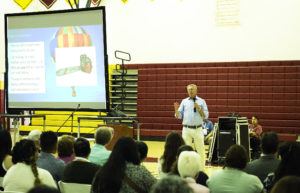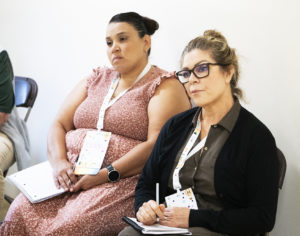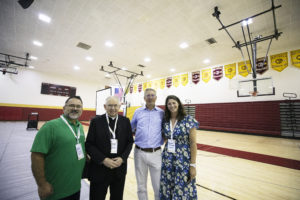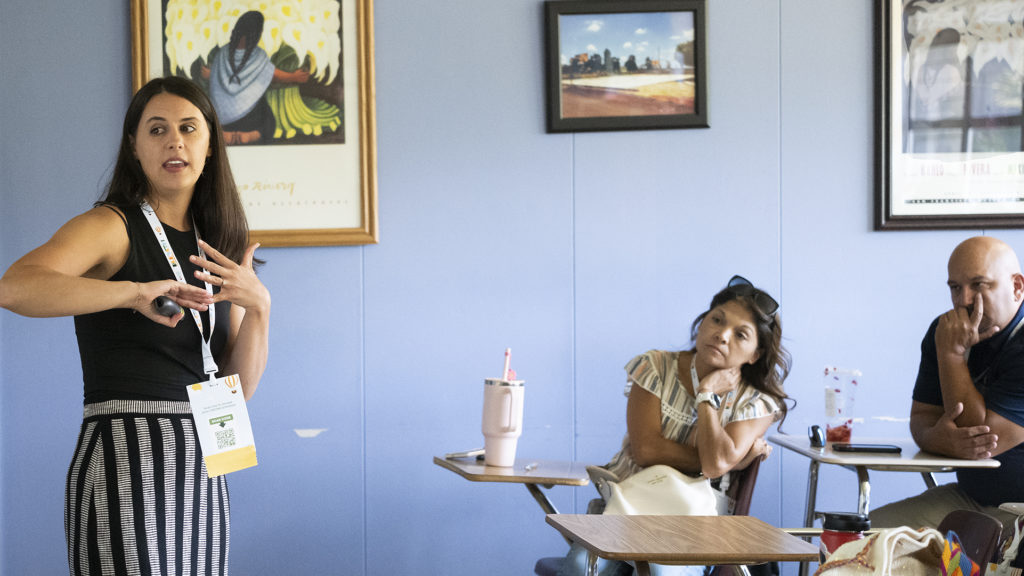The C3 Conference annually hosted by the Archdiocese of Los Angeles is all about technology, but on Day 2 of this year’s event, there was hardly a laptop in sight. Nor an iPad. If there was a smartphone out, it was mostly for attendees to sneak a glance in between sessions.
For the first time, the C3 Conference organizers used one of its two days to highlight the need to focus on self rather than technology. Gone were the devices, replaced instead with a journal and a pen that participants used for a day of reflection, chronicling, and prayer.
C3 Project Manager Paul Hernandez said this pivot was in response to some past guests’ hesitation with emerging technology.
“We need to embrace [technology], but we don’t want it to control us,” Hernandez said. “We want to learn how to control it. And that in turn will help our well-being because we all know a lot of people get stressed by the overwhelming use of technology.”

The 2024 Catholic Communication Collaboration (C3) Conference was a two-day event held Aug. 6-7 at Bishop Alemany High School in Mission Hills. The annual gathering assembles faith leaders, educators, and school administrators to explore the many ways in which technology should — and shouldn’t — be used to educate and support students.
This year’s conference, themed “Elevate,” aimed to build off last year’s discussion of growing technology — artificial intelligence (AI) was on the tip of everyone’s tongue — to explore how these tools impact our collective well-being.
Remarks from the keynote speaker, John Hollway, senior fellow at the Positive Psychology Center and associate dean at the University of Pennsylvania law school, echoed how technology — and especially social media — could be used for our well-being rather than focusing on the negative aspects.
“The question should be how do I want this technology to elevate the things that are important to get the sensations that will make me feel better,” he said.
“So the obligation for us is to be intentional and help each other, ourselves, and the people who rely on us to help them to not use this comparatively and do what we can do to control this technology because it has the risk of getting away from us.”
The first day of the conference went into familiar territory: More than 650 people attended one of the 90 workshops on a wide range of topics, such as “When and How to Use AI with Students,” “Human Dignity and the Technology Explosion,” and “The 10 Commandments of Parish Cybersecurity.”
For Christopher Alaniz, a fifth-grade teacher at St. Benedict School in Montebello, the conference was a chance to get ideas to reach his students, who are constantly grappling with technology.
“They overuse it,” Alaniz said. “Not on task, especially if they’re using it for research. They tend to get off course, off-topic. I have to constantly monitor them and make sure they’re engaged.”

On Day 2, the pace changed. After an early-morning Mass at the San Fernando Mission, attendees rotated between three sessions that all focused on getting healthy and refocused: “The Gifts of Resilience,” “The Rules of Engagement: How to Thrive and Avoid Burnout,” and “Elevating and Recharging Your Relationships.”
In the resilience session, Jan Stanley, a consultant for the Penn Resilience Team, spoke about understanding resilience, myths, and some strategies to help when people are depleted.
“You are already resilient,” Stanley said. “You wouldn’t be in this room if you weren’t resilient already. You come from different circumstances, different families that are resilient, ancestors that are resilient. All of these things have played into our life to bring us here today.”
The power of resilience, Stanley told attendees, can also rub off on the students and young people they may come in contact with.
“As educators and people affiliated with the Church, we never know who we are inspiring,” she said. “As we go about our daily lives, maybe someone in some other room is naming us as a symbol of resilience for them.”
Over at the “Rules of Engagement” workshop, Hollway spoke about what it means to be engaged, the illusions of a work-life balance, and how to know when you’re headed for burnout.
“Work and life are a permeable membrane,” Hollway said. “Don’t subscribe to the idea that they’re separate and there’s a big wall and the emotions that happen in one don’t come over into the other.”
The COVID-19 pandemic was especially catastrophic to fostering engagement, he said, and didn’t allow people — especially young people — to build the skills needed for social connections and happiness.
“If you’re 7 or 11 or 18 and you lost two years of human relationship-building to enable you to have a support network to build that trust in how you learn, that’s going to have a tail to it that we’re still dealing with,” Hollway said. “As we try to engage with our colleagues, we need to remember these things because they aren’t our fault, but they are our problem.”

Finally, at the relationships session, Amy Cattapan, an author and teacher in Chicago, said she was asked to “bring the Catholic” and detailed how to forge stronger connections with people and use faith and prayer to “fill our spiritual cups.”
In her talk, she focused on relationships in three parts: Those we serve, those who serve with us, and our relationship with God.
“God meets us where we are,” Cattapan said. “The first thing about a relationship is we gotta figure out where people are. … Do we literally and figuratively go to meet the people we are serving where they are? Or do we expect the people to come to us?”
Several attendees were especially grateful for the new sessions dedicated to wellness and recharging.
Lara Brosmer, the director of youth formation at St. Mark Church in Venice, said it was important to know that others were feeling the same way and experiencing the same challenges.
“It gives me a sense of a support system without necessarily getting it,” Brosmer said. “It’s really nice that mental health is such a big part of our faith formation. We are so used to serving that we’re not used to filling up our own cup.
“The kids are always on their phones. They’re always checked out. How do we check them in? How do we get them in the parish and in their faith? C3 is one of my fun ways of doing that before the year starts.”

